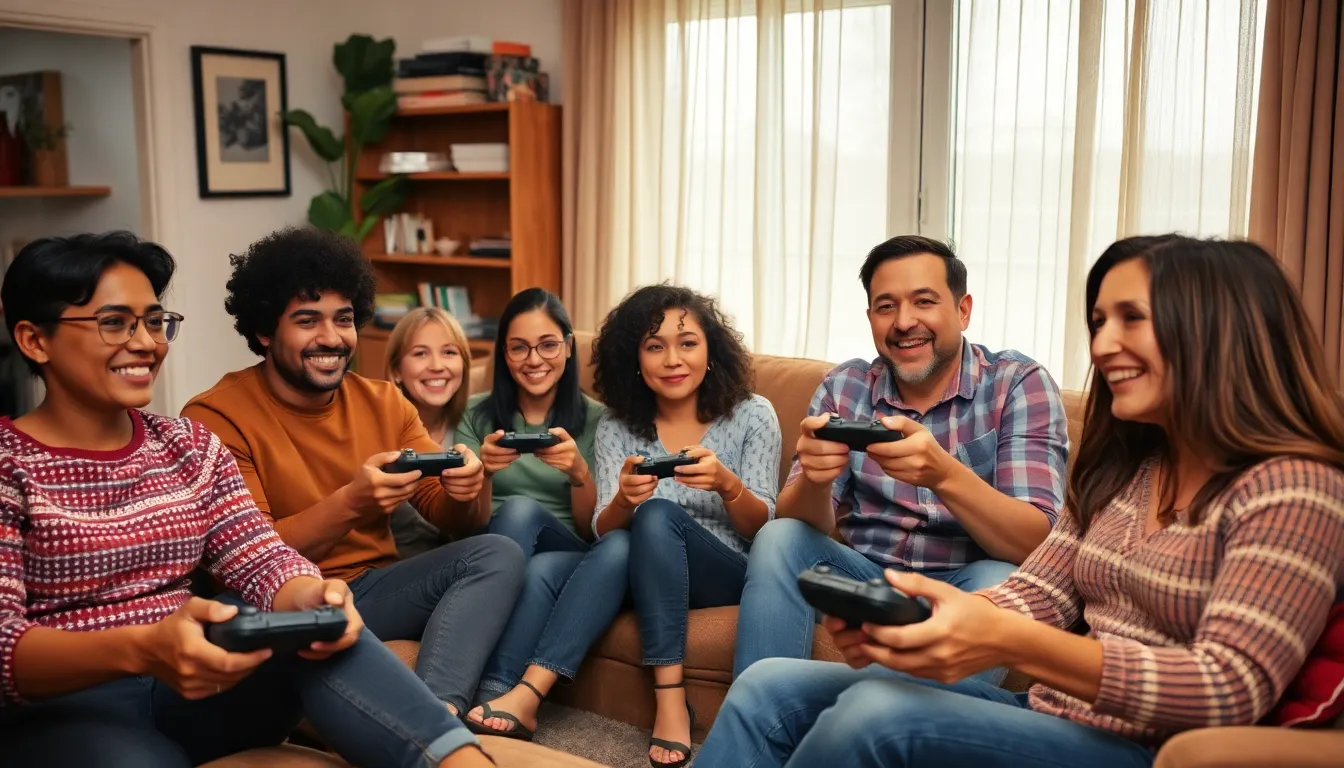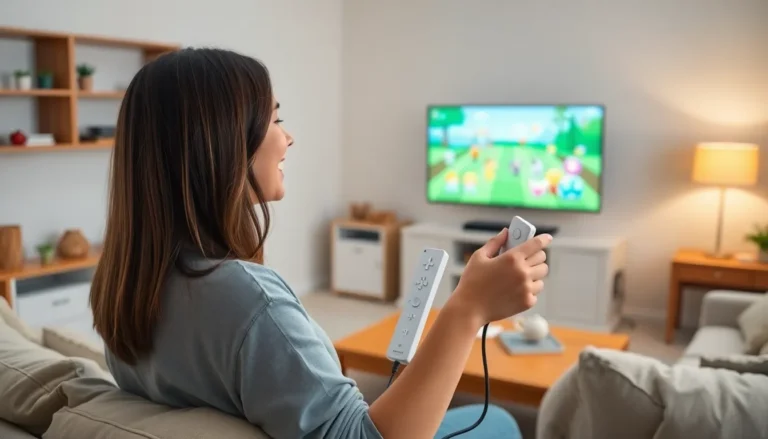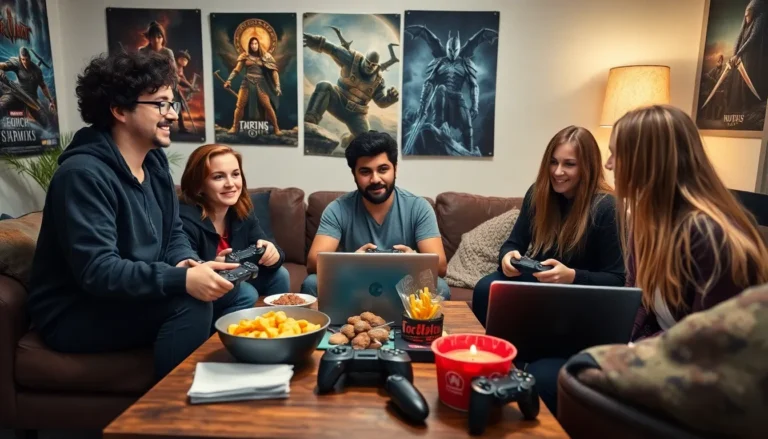Table of Contents
ToggleIn a world where adulting can feel like a never-ending series of meetings and responsibilities, video gaming offers a delightful escape. But how much gaming is too much? As the pixels dance across the screen, it’s easy to lose track of time and forget about that laundry pile silently judging from the corner. Yet, the question looms: when does a fun pastime turn into a digital black hole?
Understanding Overdertoza Video Gaming
Overdertoza video gaming refers to the extensive engagement in video games that can lead to neglecting responsibilities. Adults often find video gaming a convenient escape from everyday stresses. Engaging in this activity can be enjoyable, yet excessive playing can disrupt life balance.
Research shows that adults spend an average of 6.5 hours weekly on gaming. When this figure increases, gamers might overlook crucial tasks such as work obligations and personal relationships. The challenge lies in identifying the tipping point when gaming transforms from leisure to addiction.
Overdertoza gaming can manifest in various forms. Some adults play to relax after a stressful day, while others immerse themselves for competitive reasons. Both scenarios can lead to prolonged hours in front of screens, impacting mental and physical health.
Health experts suggest establishing limits to prevent gaming from overtaking daily life. Setting boundaries like scheduled playtime prevents negative repercussions. Regular breaks during gaming sessions enhance overall well-being and maintain productivity.
Identifying signs of overdertoza gaming is essential. Symptoms include feeling tired after extended game sessions, neglecting responsibilities, or prioritizing gaming over social interactions. Recognizing these signs prompts individuals to reassess their gaming habits.
Ultimately, understanding the impact of overdertoza gaming helps adults navigate their leisure time. Awareness of the balance between enjoyment and responsibility supports healthier gaming habits. Prioritizing essential responsibilities alongside gaming can lead to a more fulfilling lifestyle.
The Importance of Video Gaming for Adults

Video gaming holds significant value for adults, offering various benefits that can enhance quality of life.
Mental Health Benefits
Video games can serve as effective stress relievers for adults. Engaging in immersive gameplay allows players to escape daily pressures, fostering relaxation. Research shows that gaming can reduce feelings of anxiety and depression, promoting overall mental well-being. Players may find themselves in flow states, experiencing heightened creativity and focus. Furthermore, certain games encourage problem-solving skills, stimulating cognitive function. These benefits contribute to a healthier mindset, making gaming a potentially therapeutic activity when practiced in moderation.
Social Interaction and Connections
Video gaming promotes social connections among adults. Online multiplayer games encourage teamwork and communication, allowing players to interact regardless of geographical barriers. Shared gaming experiences can strengthen friendships and cultivate new relationships. Regular gaming sessions can lead to meaningful conversations and a sense of community. Many adults also join online forums and social media groups centered around gaming interests, further broadening their social circles. By fostering these connections, video gaming contributes positively to adult social lives, enhancing overall satisfaction.
Risks of Excessive Gaming
Excessive gaming poses various risks that can significantly impact daily life. Recognizing these challenges helps individuals maintain a healthy balance.
Time Management Challenges
Difficulty in managing time emerges as a primary issue for many gamers. Engagement in extended gaming sessions often leads to neglecting important responsibilities. Adults might find themselves prioritizing gaming over work or family obligations. Research shows that those who play more than the average of 6.5 hours weekly may struggle with productivity. Missing deadlines or failing to complete personal tasks becomes common. Consequently, gaming can transform dream scenarios into distractions, complicating the ability to maintain a well-balanced schedule.
Impact on Physical Health
Physical health often deteriorates due to excessive gaming. Sedentary behavior during lengthy gaming sessions contributes to health problems like obesity or cardiovascular issues. Musculoskeletal discomfort frequently arises from poor posture while gaming. Additionally, eye strain becomes more prevalent as screen time increases. Adults may also experience disrupted sleep patterns when gaming late into the night. Effective management is crucial, as maintaining physical well-being directly influences overall quality of life.
Striking a Balance
Maintaining a healthy relationship with video gaming requires a thoughtful approach. Establishing boundaries around gaming time plays a crucial role in balancing enjoyment with responsibilities.
Setting Time Limits
Scheduling gaming sessions can help adults prioritize essential tasks without sacrificing leisure. Research shows that many adults spend an average of 6.5 hours weekly gaming. Setting specific time frames for play can prevent excessive engagement and reduce the risk of neglecting responsibilities. Using timers or gaming apps can assist in tracking playtime effectively. Allocating equal time to work and leisure maintains overall productivity and satisfaction.
Choosing Healthy Gaming Habits
Engaging in games with purpose enhances the gaming experience. Selecting titles that promote relaxation, cognitive skills, or social interaction can create a more fulfilling pastime. Multiplayer online games encourage teamwork, fostering community engagement. Opting for games with shorter play sessions can limit extended hours spent on screens. Incorporating physical activity during breaks also promotes well-being, allowing individuals to balance gaming with a healthier lifestyle.
Finding the right balance in video gaming is crucial for adults. While gaming offers a valuable escape and mental health benefits, overdertoza gaming can lead to significant challenges. It’s essential for individuals to recognize when their gaming habits start to interfere with daily responsibilities and relationships.
Establishing boundaries and setting time limits can help maintain a healthy relationship with gaming. By prioritizing essential tasks and incorporating breaks, adults can enjoy the benefits of gaming without allowing it to dominate their lives. Ultimately, understanding personal limits and fostering a balanced approach to leisure activities can lead to a more fulfilling and responsible lifestyle.







